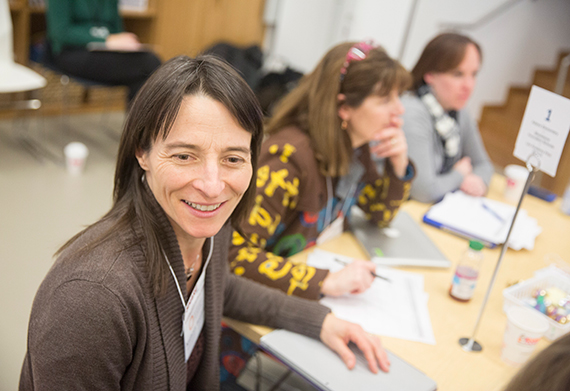A course that keeps teaching
HarvardX’s Data Wise gives teachers a new focus for grading, improves student outcomes
Data Wise, a new HarvardX course, is transforming classroom dynamics and building “collaborative inquiry” between teachers — both in and beyond the Boston Public Schools (BPS).
With more than 14,000 already enrolled in the Massive Open Online Course (MOOC), it was a group from Boston who gathered at the Harvard Ed Portal this past winter and found that they could put what they learned to immediate use.
“The Data Wise protocol allows us to focus in on a line of inquiry,” said Himilcon Inciarte, a fourth-grade teacher at the Umana Academy in Boston, one of 34 educators who participated in the January course. “The most immediate outcome for our students is that the teachers now have a very clear focus in their work, and also how we’re grading the work.”
That focus, Inciarte said, “helps us target what we’re looking for in our students’ work, and therefore any feedback we provide them is geared toward that specific aspect. The big takeaway for me was that we had to find time as a team to look at student work, and to decide next steps about instruction together.”
Moving forward, many school teams say they will use what they learned from the course and continue to meet on a regular basis to look at data through a different lens — how teachers can change teaching practice to improve student outcomes.
For Kathryn Boudett, director of the Data Wise Project and lecturer at the Harvard Graduate School of Education (HGSE), the course is a way to support teachers locally and worldwide. The free, self-paced online course, available for anyone to take at any time, is part of a portfolio of Data Wise course offerings that lead to a Data Wise Coach Certification. Three BPS data inquiry facilitators have already earned this credential, and three more will complete their coach training this summer.

“The learning really goes both ways,” said Boudett. “Data Wise has always been about listening to the people who work in schools and districts and helping them tell the story of what works for kids.”
Several BPS educators serve on the faculty of the Data Wise Leadership Institute, which takes place on Harvard’s campus each June, and the Harvard Ed Portal course in January was co-taught with BPS inclusion and data inquiry specialists.
The Data Wise model emerged when faculty and graduate students at GSE collaborated with educators from BPS on how educators could make productive use of the mountains of test data that became available as a result of 2002’s No Child Left Behind legislation.
“It’s not about trying to get a better test scores; it’s about fundamentally making sure that students understand the standards they need to master in order to make it in this world,” said Boudett. “We learned that this requires helping teachers look at lots of different data sources and then decide collaboratively about how to change what they do in their classrooms.”
“It’s been very easy to slide some of the Data Wise material right into existing structures in my school,” said Stephen Shapinsky, a math teacher at Allston’s Gardner Pilot Academy who participated in the January Data Wise course.
“Schools are inundated with testing systems and people suggesting ways to use that data. Data Wise offers a good way to put those test results in context. It’s just good work; a lot of bright people put in the hours to collect the data. Rather than our trying to build our own procedures at a school level, [the Data Wise model] is built for us already.”
Boudett views the HarvardX course as a cooperative conversation with teachers. She and her team regularly review the discussion forums, course assessments, and feedback from the thousands of participants who have taken the online course since it first became available more than a year ago. But the January course with Boston provided a unique opportunity.
“Being able to work live with Boston educators at the Harvard Ed Portal as they took the MOOC gave us an amazing window into how people really interact with the course content,” said Boudett, who incorporated that learning into version 2.0 of the course, which was just released this spring.
“To adjust instruction based on feedback from us, [the Data Wise students], models what it means to collect data, analyze it, and adjust what needs to be changed,” Inciarte said. “It’s a very important piece of the Data Wise protocol: figuring out what needs to be done and then addressing that need. I really respect that.”




